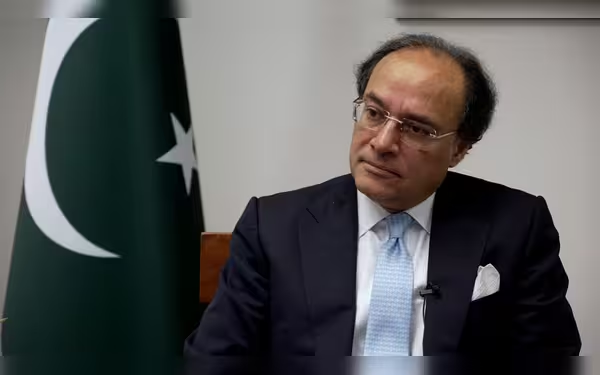Thursday, July 4, 2024 06:29 PM
Pakistan's Finance Minister Optimistic About Inflation Decline
- Inflation rates in Pakistan reached 23.1% in February.
- Recent data shows a slight improvement, with inflation slowing to 20.7% in March.
- Efforts to stabilize the economy include cracking down on hoarders and reducing key input prices.
 Image Credits: The National
Image Credits: The NationalInflation in Pakistan remains a significant concern, with rates reaching 23.1% in February. Government efforts, IMF agreements, and global investments aim to stabilize the economy and reduce inflationary pressures.
Inflation remains a pressing issue for Pakistan's economy, impacting market dynamics and citizens' lives. Despite government efforts to implement structural reforms, inflation rates have been high, reaching 23.1% in February. However, recent data from the Pakistan Bureau of Statistics shows a slight improvement, with inflation slowing to 20.7% in March.
Various measures, such as cracking down on hoarders and reducing prices of key inputs, are being taken to address inflation. The government's agreement with the IMF and expected foreign investments aim to stabilize the economy further. Finance Minister Muhammad Aurangzeb noted a decline in inflation from 37-38% to 20-22%.
Experts emphasize the need for comprehensive strategies to stabilize the economy and reduce inflationary pressures. Suggestions include lowering energy and transportation costs, modernizing industries for increased productivity, and implementing effective market regulations.
Global financial institutions predict a gradual decrease in inflation, with the Asian Development Bank forecasting a drop to 15.0% for fiscal 2024-25. Tight monetary policies and a focus on macroeconomic stabilization are key factors in achieving this target.
External factors like global inflation trends and geopolitical tensions also influence Pakistan's inflation rates. Economists stress the importance of a multi-faceted approach, including stricter regulations on pricing, tackling hoarding practices, and improving agricultural productivity.
Efforts to enhance industrial efficiency, negotiate international agreements, and promote domestic reforms are crucial for economic revival and inflation control. Recent commitments from Saudi Arabia for investments offer hope for economic growth and stability in Pakistan.
Addressing inflation and ensuring economic stability in Pakistan require a coordinated effort from the government, industry, and international partners. By implementing comprehensive strategies, enhancing regulatory frameworks, and fostering investment, Pakistan can work towards a more stable economic environment and alleviate the burden of inflation on its citizens.













